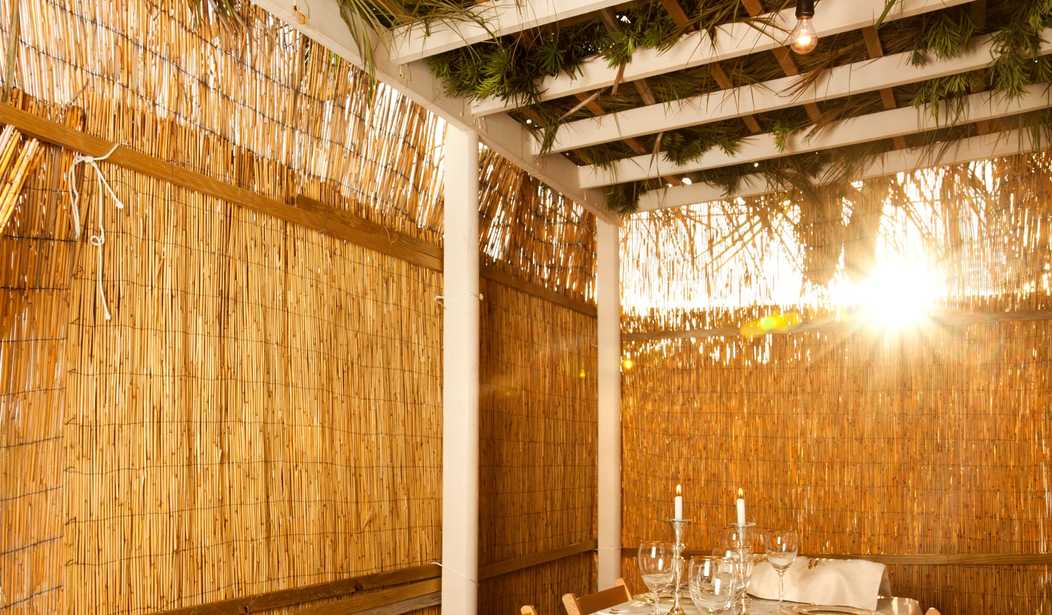Only four days after Yom haKippurim we find ourselves in the midst of another holiday, Sukkoth. The popular compendium Séfer haToda‘ah by Rabbi Eliyahu Kitov notes that Sukkoth involves more discrete mitzvoth than any other holiday, and suggests that it follows so closely on Yom Kippur because, having been (we profoundly hope) exonerated fom any sins of the past, G-d wants us now to be so engaged in preparations for perfomance of a pack of mitzvoth that we barely have time to sin, while piling up the merits of observance.
The holiday is named for one of the central mitzvoth, that of living, or at least taking our meals in, a temporary hut called a sukka. The walls of the hut can be constructed from any sort of material, but the roof must be covered with sëchach, a thatch made of plant material which is nonetheless open to the sky somewhat; the Talmudic formulation is that tzillëthah mërubba méchamathah (“its shade is greater than its sunlight”), though there must also be some sunlight poking though.
The written Torah describes this mitzva in Leviticus XXIII,42-43: Bësukkoth téshëvu shiv‘ath yamim kol ha’ezrach miYisra’él yéshëvu bësukkoth lëma‘an yédë‘u dorotheichem ki bësukkoth hoshavti eth bënei Yisra’él bëhotzi’i otham mé’eretz Mitzrayim (“In sukkoth you will dwell seven days; every citizen of Israel will dwell in sukkoth in order that your generations will know that in sukkoth I settled the bënei Yisra’él when I brought them out of the land of Egypt.”)
There are two views, the Talmud tells us, of what it meant that Ha-Shem “settled the bënei Yisra’él in sukkoth” on their way out of Egypt: “It is taught: Rabbi Eli‘ezer says, Just as a man may not fulfill his duty on the first day of the holiday with his fellow’s lulav, for it is written: ‘And you will take for yourselves on the first day [of Sukkoth] the fruit of a splendid tree, tops of palms’ (Leviticus XXIII,40), i.e. of your own, so does he not fulfill his duty with his fellow’s sukka, for it is written: ‘The holiday of Sukkoth you will make for yourselves seven days’ (Deuteronomy XVI,13) – i.e. your own. And the [other] Rabbis say, Even though we have said that a man does not fulfill his duty on the first day of the holiday with his fellow’s lulav, he still does fulfill his duty with his fellow’s sukka, for it is written, ‘every citizen of Israel will dwell in sukkoth,’ teaching that all of Israel are fit to sit in one sukka” (Sukka 27b).
As Rashi explains the issue, the last statement implies a single sukka in which people would sit in relays, one after the other, taking “ownership” of the sukka from his predecessor by “borrowing” it.
The question almost asks itself: Why assume such an arrangement at all? Why would the sukka be so small? Why could they not have built one very large sukka, each “citizen of Israel” owning his part?
If we turn back a bit earlier in the same volume, we find the following dispute concerning our biblical passage: “For it is taught, ‘For in sukkoth I settled the bënei Yisra’él’ – these were the clouds of glory, are the words of Rabbi Eli‘ezer, and Rabbi ‘Aqiva says, They made sukkoth for themselves” (Sukka 11b).
So Rabbi Eli‘ezer sees in the reference to sukkoth in the desert a metaphor for the protective clouds which accompanied Israel on their sojourn there, while Rabbi ‘Aqiva believes it to be a reference to literal sukkoth. But Rabbi ‘Aqiva’s opinion is rather startling, given that the Torah itelf tells us that Israel complained: Vëlamma he‘elithanu miMitzrayim lëhavi’ othanu el hamaqom hara‘ haze lo’ mëqom zera‘ uthë’éna vëgefen vërimmon umayim ayin lishtoth (“And why did you bring us up from Egypt to bring us to this bad place, not a place of seed and fig and vine and pomegranates and there is no water to drink”; Numbers XX,5).
So where in this howling wilderness did Rabbi ‘Aqiva think they found the plant matter to thatch these sukkoth? The question is not trivial, given that elsewhere the Talmud establishes the general principle that the halacha generally agrees with Rabbi ‘Aqiva rather than his comrade (Rabbi Eli‘ezer);” (‘Eiruvin 46b; cf. also Tosëfoth Yom Tov on Kélim III,2).
In a comment on Exodus XXV,5, Rashi follows the Midrash Tanchuma in asking: “‘And shittim wood.’ And where did they find it in the desert? Explained Rabbi Tanchuma, Ya‘aqov our father saw prophetically that Israel were destined to build the Mishkan in the desert and planted them and commanded his sons to take them with them when they left Egypt.”
Rashi was essentially bothered by our same question: The Sinai is not renowned for its forestry. Hence, in order to have the necessary wood to construct the Mishkan, they cut down and brought with them the descendants of the cedars planted foresightedly by Ya‘aqov.
This, it seems to me, could also have served as a source of branches for the sukkoth which Rabbi ‘Aqiva insists they built in the desert.
Now let us re-examine our original question.
As we noted above, in disputes between Rabbi ‘Aqiva and Rabbi Eli‘ezer, the halacha is generally decided like Rabbi ‘Aqiva. This being so, it stands to reason that the Rabbis in the case of their dispute with Rabbi Eli‘ezer reflected the opinion of Rabbi ‘Aqiva. The question, then, is how much shittim wood was left after building the Mishkan to be used as sëchach for the sukka?
The answer, presumably, is not much. Hence, only a smallish sukka could have been built, and for it to accommodate “every citizen in Israel” it would have been necessary to occupy it in shifts, one after the other. In commemoration of the oiginal dispensation, the halacha allows for the exception that a man can fulfill his duty by sitting in another’s sukka, despite the verse’s reading “for you.”
Rabbi Eli‘ezer, for his part, considers the sukka to be a metaphor for the clouds. Hence, he sees no historical basis for allowing an exception to the clear language of the verse in Deuteronomy, on the basis of which he rules that “every citizen of Israel” needs to build his own sukka to fulfill his duty properly.
The halacha, as we have said, agrees with the other Rabbis and Rabbi ‘Aqiva, Rabbi Eli‘ezer’s colleagues. We learn from this that customs in Israel have a solid, historical basis and should not, therefore, be lightly regarded.









Join the conversation as a VIP Member